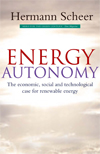 EUROSOLAR Press Release, Prague/Bonn/Brussels, May 20th, 2005
EUROSOLAR Press Release, Prague/Bonn/Brussels, May 20th, 2005 Further improvements required to tap the country’s wind and other renewable energy potentials
The Czech Parliament has adopted a new feed-in law for renewable energy at the end of March which was published at the beginning of May. The new legislation includes a shift towards a feed-in tariff scheme which has been the main driver in the internationally leading wind markets.
WWEA, EREF, Eufores, Eurosolar and Nova Energie have sent a letter today to the Czech Prime Minister in which they congratulate the Czech Government on the new legislation. The renewable energy associations also point out that in order to initiate the start of a successful domestic Czech renewable energy industry and to create benefits for the local population, further amendments will be necessary.
The new Czech renewable energy law includes feed-in tariffs respectively green boni for renewable energy electricity. The Czech Republic with this decision has followed the example of the worldwide leading wind energy countries Spain, Germany, and Denmark.
However, the feed-in tariff has not been defined in the law in concrete which makes it difficult at the moment to plan or even finance any renewable energy projects. The feed-in tariff according to the law will have to be defined annually by the energy regulator. The renewable energy associations welcome the fact that the feed-in tariff will be guaranteed for new installations for a period of 15 years. One decisive step will now be the setting up of a sufficient remuneration – examples for such successful tariff schemes can be found in countries like Spain, France, Germany or Brazil.
The renewable energy associations have written in a letter sent today to the Czech Prime Minister:
“We congratulate the Czech Government and Parliament on the new law and would like to encourage you to further improve the new legislation. In the wind pioneer country Denmark, as in several other parts of the world, an intelligent and long-term oriented feed-in tariff scheme was the basic precondition for harvesting the decentralised renewable energy and for creating a new economic key sector, including many new jobs mainly in rural areas. The Czech Republic with its long-standing tradition and expertise e.g. in the machinery and steel sector, with Skoda already the world’s largest producer of shafts for wind turbines, has excellent perspectives when following such an example – given the appropriate frameworks are in place.”
The renewable energy associations underline that another very important amendment will be necessary in order to enable independent power producers to participate in the new market for renewable energy electricity: the access to the grid. Whilst the current law guarantees access to the grid to renewable energy electricity in general, there is one clause which may be misused: Access to the grid can be denied in case of a risk for grid stability. The renewable energy associations strongly recommend to amend the law so that the grid operator is obliged to reinforce the grid and that the connection has to be made to the closest grid in geographical terms.
The renewable energy associations also point out that under the current circumstances, unfortunately it will still be very difficult for new independent and local power producers to invest in renewable energy projects in the Czech Republic. The associations hope that the Czech government as well as the parliament will do the necessary amendments to let small and medium sized enterprises as well as the local population and the whole country benefit from this important new and clean technology. The complete letter to the Czech Prime Minister can be downloaded from:
www.wwindea.org



